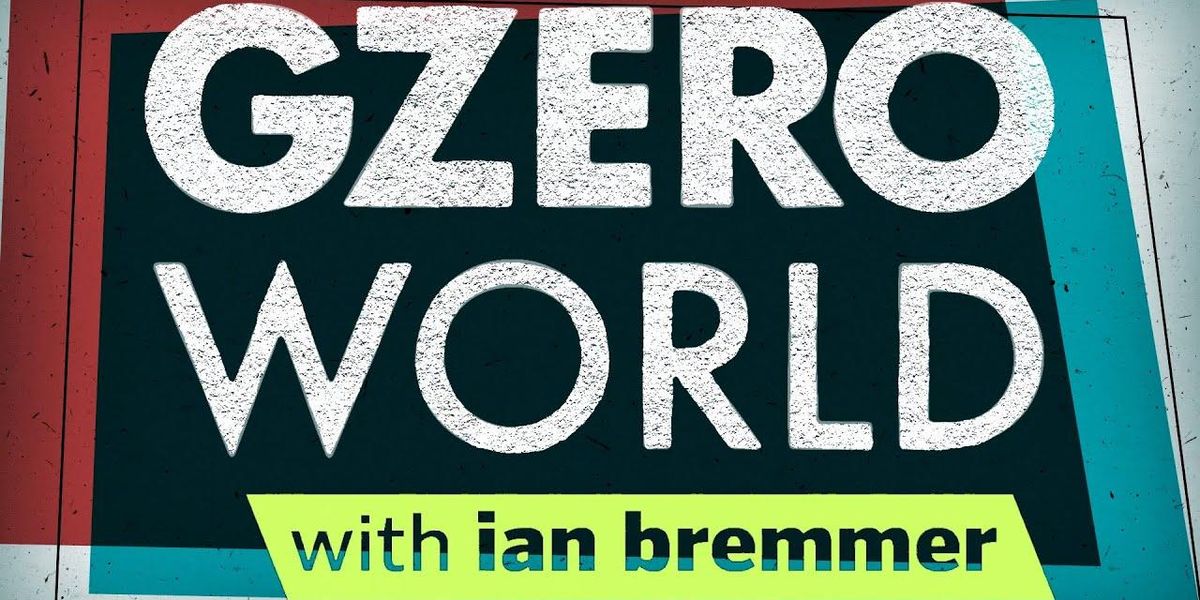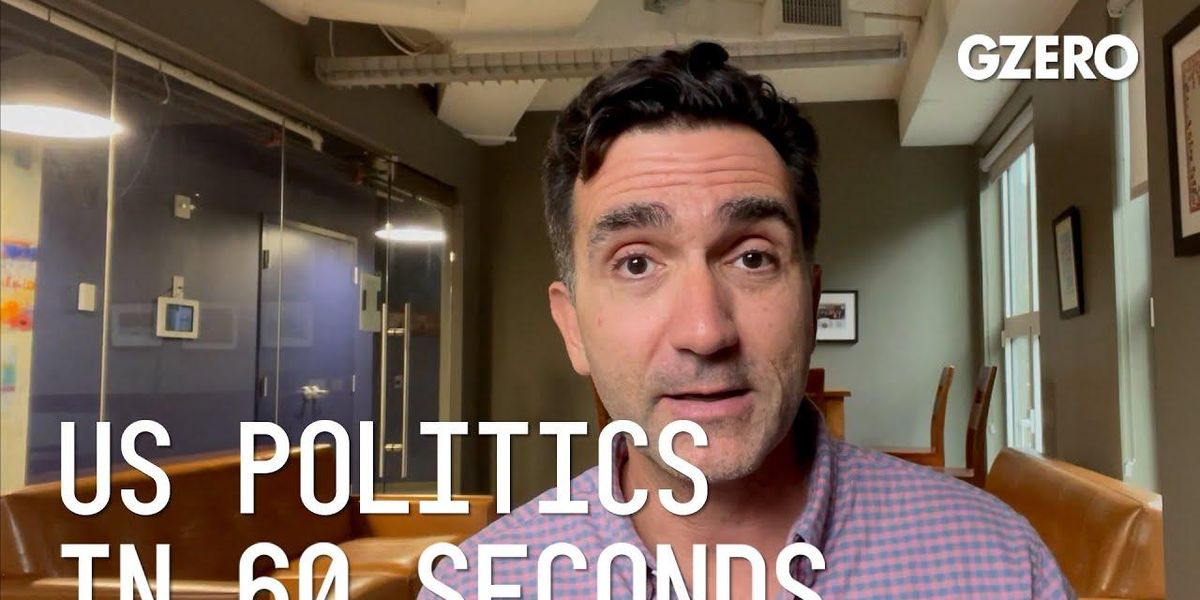Trending Now
We have updated our Privacy Policy and Terms of Use for Eurasia Group and its affiliates, including GZERO Media, to clarify the types of data we collect, how we collect it, how we use data and with whom we share data. By using our website you consent to our Terms and Conditions and Privacy Policy, including the transfer of your personal data to the United States from your country of residence, and our use of cookies described in our Cookie Policy.
{{ subpage.title }}
American democracy dodged a bullet in 2022
Were fears about US democracy in peril being overblown?
No, and in fact we're underestimating the danger, says Tom Nichols, a staff-writer at The Atlantic and author of the book "Our Own Worst Enemy: The Assault From Within On Modern Democracy."
"Election deniers and various other cooks and weirdos almost took over state offices," he tells Ian Bremmer on GZERO World, "and they're all coming back for another bite of the apple in 2024.”
For Anne-Marie Slaughter, former US State Department official and now CEO of New America, the main takeaway from the US midterms was Gov. Ron DeSantis's huge margin of victory in Florida and the many Trump-backed candidates who lost big. Both outcomes have massive implications for 2024.
Will the former POTUS beat DeSantis to win the GOP presidential nomination? Nichols, who used to be a Republican, puts Trump's odds at 60-70% and says he's amazed that some people question President Biden running again. It wouldn't be a debate for most other presidents.
Watch the GZERO World episode: On Russia’s reckoning, China’s vulnerability & US democracy’s Dunkirk
- How Democrats used GOP wins against them ›
- Back to divided government: Biden's silver lining from a Republican House ›
- US democracy after US midterms: polarized voters & Trump's GOP ›
- US midterms: What we know and what we don’t ›
- 2022: The year of fleeting political power & the will of the people - GZERO Media ›
DC journalists Susan Glasser & Peter Baker join Ian Bremmer on GZERO World
With just a few weeks remaining before the deeply consequential 2022 midterm elections in the United States, Ian Bremmer speaks to two of Washington’s top reporters in front of a live audience in New York City. This special episode from the fifth season of GZERO World with Ian Bremmer features DC power couple and co-authors Susan Glasser, Washington columnist for The New Yorker, and Peter Baker, chief White House correspondent for The New York Times. They discuss their bestselling new book, "The Divider: Trump in the White House, 2017-2021," the upcoming US midterm elections, and the state of American democracy in 2022.
Follow @gzeromedia and watch the interview on US public television starting Friday, October 21 (check local listings), or on gzeromedia.com.
Herschel Walker's abortion news bad for GOP, but ad spend will determine control of US Senate
Jon Lieber, head of Eurasia Group's coverage of political and policy developments in Washington, DC shares his perspective on US politics.
Which US Senate candidate has had the worst week?
The battle for the Senate remains very close with both parties having plausible paths to a majority in the November elections. Republicans have massively underperformed in several states that were held by Democrats that were supposed to be competitive this year, but aren't.
New Hampshire looks all but out of reach given the unpopularity of the Republican candidate there, and while Arizona could still be a pickup, the forecast today is leaning strongly towards the incumbent Democratic senator, an ex-astronaut who has not made any major mistakes so far in his re-election bid. Far more interesting are races in Nevada and Georgia. Republicans could potentially pick up one or even two seats.
The race in Pennsylvania where TV doctor Mehmet Oz is suffering under the spotlight as a first-time candidate, potentially costing the Republicans a seat that they currently control. Oz is coming on stronger in recent weeks, attacking the Democrat in the race as being too liberal for the swing state. These attacks have helped Oz close his polling gap from 10 points to just below six, and he's been benefiting from millions of dollars in outside spending that's helping him, despite some damaging reporting this week that he experimented on dogs earlier in his career.
Having a far worse week than Oz is Georgia candidate Herschel Walker, a former running back at the University of Georgia who's running for a seat that Republicans need to win if they want to control the Senate. A news site this week reported that Walker, who's now pro-life, paid for his girlfriend to have an abortion in 2009. His son, who has an influential YouTube channel as a conservative, came out on Twitter condemning his dad for abandoning him and his mom, a woman that Walker had previously threatened with a gun.
Prior to this week, Walker had been seen as having probably the Republicans' best chance of picking up a seat in this cycle, and he still could pick up that seat, but the Georgia election's a weird one because if neither candidate gets to over 50% of the vote, they will go to a runoff in December 6th where turnout could be a lot different than it will be on election day in November. Walker will no longer benefit from the popular incumbent governor on top of the ticket.
Walker is probably having the worst week of anybody running for Senate right now, but these races are far from over and will be defined by tens of billions of dollars in negative advertising over the final weeks of the campaign.
Lessons from US midterm primaries in Georgia, Texas, and Alabama
Jon Lieber, head of Eurasia Group's coverage of political and policy developments in Washington, discusses Tuesday's primaries.
What happened in Tuesday's primaries?
Several states held primary elections on Tuesday of this week with the most interesting elections in Georgia, Texas, and Alabama. In Georgia, two incumbent Republicans who were instrumental in certifying the results of President Joe Biden's victory in 2020 won the nomination for governor and secretary of state against two Trump-backed opponents. The sitting governor who Trump had been targeting for months over his role in the 2020 election won by over 50 points, a sign that while Republican voters still love Donald Trump, his hold over the party is not absolute. This is going to create an opening for challengers in the 2024 presidential election cycle.
In Alabama, a primary for who will take the seat of retiring Senator Richard Shelby is going to a runoff between Shelby's chosen replacement, his former chief of staff, and a very controversial House member who President Trump had endorsed but then unendorsed when he was thought to be too weak a candidate. He now has a shot at the nomination with a runoff election in June and if he wins, he will be one of the first full throated deniers of Joe Biden's election results to serve in the United States Senate.
In Texas, the most conservative house Democrat, who is a bete noir of progressive activists, again held off a challenge from a progressive activist running to his left. The incumbent had been endorsed by House leadership while his challenger had been endorsed by national progressives like Bernie Sanders. But she was unable to unseat the incumbent in a very Hispanic district. Elsewhere in Texas, a son of the Bush political dynasty lost his race for attorney general to the sitting attorney general, who has recently struggled with ethical problems.
Finally, one of the biggest stories of the night was turnout in Georgia, which broke previous records for midterm primaries, despite worries that had been pushed by Democrats about a new election law that they claim would suppress minority votes. We'll never know the counterfactual, how many people might have voted in the absence of this new law but the fact that the turnout was so high will take some of the political sting over accusations of voter suppression for a lot of new Republican laws that had passed and which several American corporations have reacted to very strongly in the wake of the 2020 election controversy.
January 6 committee partisan battle; SCOTUS rules on election reform
Get insights on the latest news in US politics from Jon Lieber, head of Eurasia Group's coverage of political and policy developments in Washington:
House Speaker Nancy Pelosi is forming a January 6th committee to investigate the Capitol insurrection. What do you expect to come from it?
Well, the committee is allowed to perform with the input from minority Republicans, but the Republicans are basically refusing to participate. Which means that most committee members, with the exception of probably Liz Cheney, the Trump critical member of Congress from Wyoming and daughter of the former vice president, are going to be Democrats. And the Democrats are going to probably go into this with an earnest desire to look at what happened on January 6th, who instigated the riot, why it happened, why the signs were missed at the Capitol by the Capitol police and others. What's likely going to come out of this is a lot of partisan messaging, trying to link the Republican party to the insurgence that stormed the Capitol on January 6th. That will help to harden views around January 6th and lead to more ongoing partisan battling in the advance of the 2022 midterm elections. So, expect a lot of heat, but not a lot of light to come out of this investigation. It'll probably be dismissed by Republican critics, even if its findings were to be sound.
The Supreme Court this week ruled on several voting rights cases. What are the implications for the future?
The Supreme Court this week ruled in a voting rights case in Arizona that limited the application of Section 2 of the Voting Rights Act. Which, after the Supreme Court's ruling on Section 5 of the Voting Rights Act several years ago, undermines some of the protections that are provided by the Act by requiring extremely high standard for plaintiffs to show that an election law is in fact discriminatory. What the court wanted to say was that the discriminatory effects are not enough to show discrimination, and this will make future cases brought under Section 2 unlikely to succeed. This is relevant because the DOJ just last week sued the state of Georgia for the discriminatory impact of their new voting rights law. The burden will be on them now to show a racially discriminatory intent. So, this is good news for Republicans who are trying to pass more laws in states that roll back some of the loosenings of election law that we've seen in recent years, particularly during the pandemic. But it's bad news for election law reformers and Democrats who want to try to make voting as easy and accessible to as many groups as possible as they can. One further implication of this new ruling is that the Democrats in Congress will continue to push on a new voting rights act. You've got at least two holdouts among Democrats who don't want to change the legislative filibuster rules. And no Republicans are expected to embrace those reforms, which means this will continue to be a partisan fight, at least through the midterm elections, and probably beyond. A very big issue in us politics
- The Graphic Truth: SCOTUS vacancies in presidential election years ... ›
- While you were watching the insurrection, Democrats won the US ... ›
- ANARCHY! How the world covered the insurrection in DC - GZERO ... ›
- Should Democrats abolish the filibuster? - GZERO Media ›
- Podcast: Finding Common Ground in Congress After the ... ›
- The worst time to enter Congress: Republican Congresswoman ... ›
Grading President Biden's first 100 days; 2020 US Census helps Sun Belt states
Get insights on the latest news in US politics from Jon Lieber, head of Eurasia Group's coverage of political and policy developments in Washington:
How would you grade President Biden's performance in his first 100 days?
Well, Biden's done pretty well in this first 100 days. He's done a good job on what's the number one most important issue facing his administration and that's the coronavirus response. He hit his goal of 100 million vaccinations within the first month or so of his administration. And they increased that to 200 million vaccinations, which they hit on day 92. So that's a pretty successful start. They inherited a lot of that from President Trump to be fair. Operation Warp Speed set the US up for success and Biden delivered after he came into office. And of course, the second thing is his COVID relief package, which the US has taken advantage of a favorable funding environment to borrow trillions of dollars and get them into the hands of American small businesses and families and has really helped the economy through what has been a very bad year but could have been a lot worse if the government hadn't intervened. The bill has been very popular, and it set the stage for a follow on bill that Biden wants to deliver for big priorities for democrats later this year, potentially as much as $4 trillion in spending.
Less good are kind of the external challenges that he's been facing. He changed his mind on his refugee policy. He's got a major problem with a flood of immigrants at the southern border. That's really unsolvable. And there's been a rash of high-profile shootings that it's going to be really, really hard for the federal government to do anything about because of polarization and the lack of 60 votes in the Senate. So overall, I think you've got to give them a solid A, A- for his first 100 days and now is probably the time when it starts getting tougher as he starts planning even bigger long-term things.
Who are the winners and losers from the 2020 US census results?
Well, there's been a population shift over the last 10 years from kind of declining Rust Belt states to booming Sun Belt states. And you saw states like Texas, Arizona, Florida gain seats, but not as many as expected. Texas was thought to get three, but they only got two. California lost a seat for the first time ever. And because of this, you're going to see a steady shift of power to these southern Sun Belt states, which are largely controlled by Republicans who will, again, as they did in 2010, have the advantage in the redistricting process that will determine who controls Congress, gives them an edge up in the 2022 midterm elections, and really puts the Democrats' are already very thin majority in peril.
Biden infrastructure plan would boost jobs; Georgia voter law tensions
Jon Lieber, Managing Director of the United States for the Eurasia Group, shares his insights on US politics:
What specifics do you expect to be in Biden's "build back better" infrastructure plan?
Well, this is really a two-part plan. The first part Biden's rolling out this week, and it's focused mainly on infrastructure. Bridges, roads, tunnels, transit, the whole infrastructure smorgasbord, including on broadband deployment, as well as investing in things like rural hospitals, schools and upgrading buildings to be more energy efficient. Biden's proposed between $2 and $2.5 trillion depending on how you do the math, paid for by tax increases primarily falling on the corporate sector that actually spread out over 15 years, as opposed to the bill's spending, which spreads out over 10. That means the bill will be mildly stimulative to the economy on top of creating potentially new jobs through the direct spending that's going to happen.
The tax increases are focused largely on corporate America, higher corporate tax rate, changes in the way US taxes its multinational corporations, and other changes that come on the individual side, which will be primarily used to fund the second half of the plan, which is going to be focused on more of a human services element. These are things like education, healthcare, subsidies for daycare, universal pre-K, community college, and other things that the Biden administration contends have to be invested in to keep the American economy going. Now, these tax increases are going to be really controversial with Republicans, which means you're probably not going to see a lot of Republicans vote for this. But Democrats are pretty aligned around doing something big and meaningful in advance of the 2022 midterms. So both of these bills probably pass into law before the end of the year.
What's going on with the Georgia voter law?
Well, in the wake of a 2020 election, where President Trump claimed there was widespread fraud, Republican politicians are now moving across the country to roll back some of the expansions that were done during the coronavirus pandemic to make it easier to vote. In Georgia, this has meant curtailing the ability to vote on Sundays, it's meant requiring a photo ID, and it's meant limiting to some extent, the ability to apply for an absentee ballot. Most of these changes are rolling the voting rules back by a couple of years. This is not the apocalyptic changes that the Democrats have been claiming, but the Democrats are really motivated to stop all of this from happening because they want to open up voting and make it as easy as possible for their constituents to get out. They typically do better at higher turnout elections. Republicans typically do better in lower turnout elections.
So for Democrats this is really, for both parties, this is really considered an existential threat, and the voting rules are going to be a really important battleground over the next 12 to 18 months. At the federal level, the Democrats are pushing a bill, H.R. 1, that would fundamentally alter the way elections are conducted in this country, including by changing money in politics and eliminating partisan gerrymandering, by requiring each state to use a nonpartisan commission to draw the districts for the House of Representatives. If it passes, and I don't think it will because it would require today 60 votes in the Senate, but if it were to pass, it would be a big structural shift towards the Democrats in US elections.






